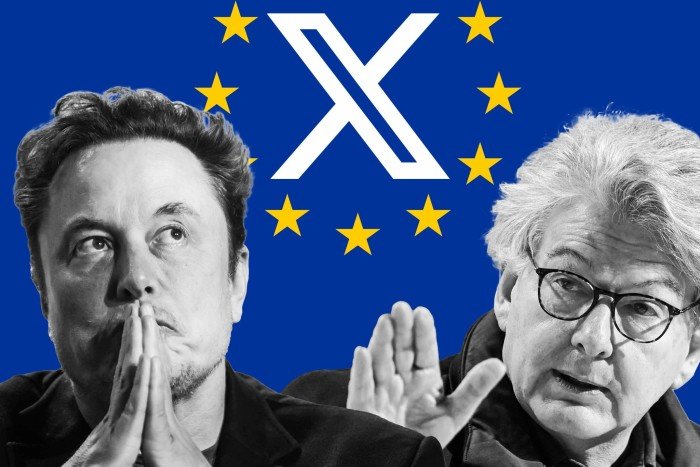This article is an online version of our FirstFT newsletter. Subscribers can sign up for our Asia, Europe/Africa or Americas edition to receive the newsletter every weekday morning. Explore all our newsletters here
Good morning. Japan’s Prime Minister Fumio Kishida has just announced that he will be stepping down next month. Below we have more on this morning’s breaking news, as well as detailed information on the EU’s dispute with Elon Musk and Starbucks’ new CEO.
But first back to Europe, where rising wages in Germany are raising questions about eurozone interest rate cuts expected in September.
Negotiated wages in the eurozone’s biggest economy are expected to soar 5.6 percent in 2024, according to agreements reached between January and June, the fastest pay rise since 2000. Although the increases far exceed rate-setters’ overall 2 percent inflation target, policymakers in Frankfurt have included “elevated” wage growth in their forecasts.
The European Central Bank’s calm on wage pressure is due to the belief that workers are still “catching up” after inflation eroded their purchasing power. Even taking into account this year’s 5.6% wage increase, only half of German workers’ losses between 2021 and 2023 have been made up. Here’s why some economists don’t share the ECB’s confidence.
And this is what I’m keeping an eye on the most today:
-
Economic data: The UK, US and France publish their July consumer price indices, while the EU publishes figures on employment, industrial production and second quarter GDP.
-
Sudanese War: Ceasefire talks between the Sudanese army and the US-brokered paramilitary Rapid Support Forces begin in Switzerland.
-
Abbas in Türkiye: Palestinian Authority President Recep Tayyip Erdoğan will meet in Ankara before addressing parliament tomorrow.
-
Results: Report by Aviva, Balfour Beatty, Cisco, Tui and UBS.
Unhedged’s Robert Armstrong and other FT experts from London to Tokyo will discuss the recent stock market turmoil in a subscriber-only webinar today at 12pm (BST). Register here.
Five Top Stories
1. Joe Biden said he does not expect Iran to attack Israel if a ceasefire agreement for Gaza is reached. Washington has been preparing for Tehran or its allies to retaliate against Israel this week for the killings of Hamas and Hezbollah leaders, and has sent more warships and fighter jets to help Israel defend itself against an attack. Here are the latest developments ahead of ceasefire talks tomorrow.
2. Japanese Prime Minister Fumio Kishida is about to resign after announcing he would not seek re-election in a contest next month to lead the ruling Liberal Democrats. His decision this morning ends a three-year tenure as prime minister and months of speculation about his ability to survive a political funding scandal and rising living costs. Read the full story.
3. AstraZeneca’s planned £450m investment in a UK vaccine plant is now in doubt The government wants to reduce the amount of state aid available for the project, insiders say, raising fears that the pharmaceutical group will cancel the project and move it to France.
4. Ukrainian forces yesterday attempted to consolidate their gains in newly captured Russian territory After capturing hundreds of Russian soldiers, kyiv’s shock offensive has quickly gained significant ground in the Kursk region, embarrassing Vladimir Putin and boosting Ukrainian morale. Here are the latest updates on the war.
5. A restructuring at JPMorgan Chase has prompted a series of high-profile departures. Chief Executive Jamie Dimon passed over three of Pinto’s protégés for top jobs, people familiar with the matter said, dismantling his power base and fueling speculation about Pinto’s own future at the Wall Street bank.
News in depth

Just hours before Elon Musk’s interview with Donald Trump on X yesterday, the EU’s internal market commissioner issued a threat against “illegal content” on the platform owned by the firebrand billionaire. Thierry Breton’s intervention, quickly repudiated by Brussels, has stoked tensions that have already been simmering since the bloc’s first such investigation into the social media company, and heightened concerns in Europe at a time when disinformation and deepfakes have helped fuel political discord.
We are also reading…
-
Starbucks: Can Brian Niccol bring the winning ingredients that drove Chipotle’s stock price up 800 percent to his new job at the helm of the world’s largest coffee chain?
-
Iran’s Olympic athletes: When they hugged each other in Paris, two Iranian athletes – one who left the country and one who stayed – highlighted the dilemma facing Iran’s youth, writes Najmeh Bozorgmehr.
-
SECOND: Hedge funds and buyout firms are launching a wave of legal challenges against the authority of the US regulator in their bid to force greater transparency in the sector.
-
Water on Mars: Evidence of an underground reservoir has presented scientists with the supernatural challenge of searching for life on the Red Planet, writes Anjana Ahuja.
Chart of the day
Tech giants are on the cusp of becoming some of the biggest energy consumers of the future, as they race to develop power-hungry artificial intelligence that could threaten their net-zero commitments. Before then, they are working behind the scenes to shape a once-in-a-decade rewrite of the rules governing how pollution from energy use is disclosed.

Take a break from the news
Adèle Rosenfeld’s powerful debut novel explores what it’s like to live with an invisible disability, writes Lucy Popescu. Through her narrative, Rosenfeld weaves together philosophical and medical reflections. Jellyfish don’t have ears. It is a profound, sometimes playful meditation on deafness and the impact that sensory loss has on human relationships.

Additional contributions by Harvey Nriapia and Benjamin Wilhelm
#FirstFT #Rising #German #wages #fuel #concerns #ECB #rate #cut